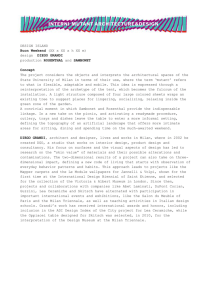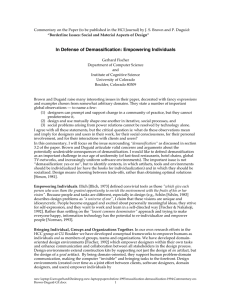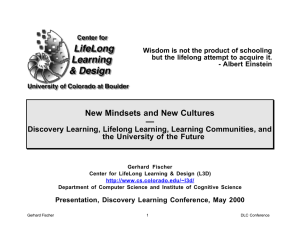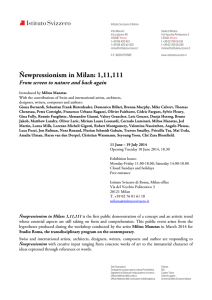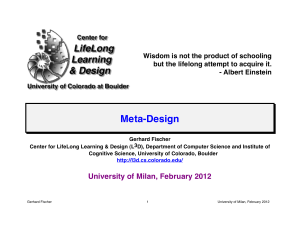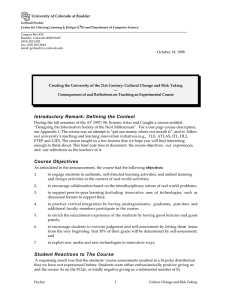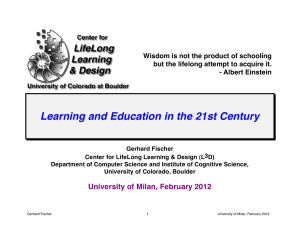Context-Aware Systems
advertisement
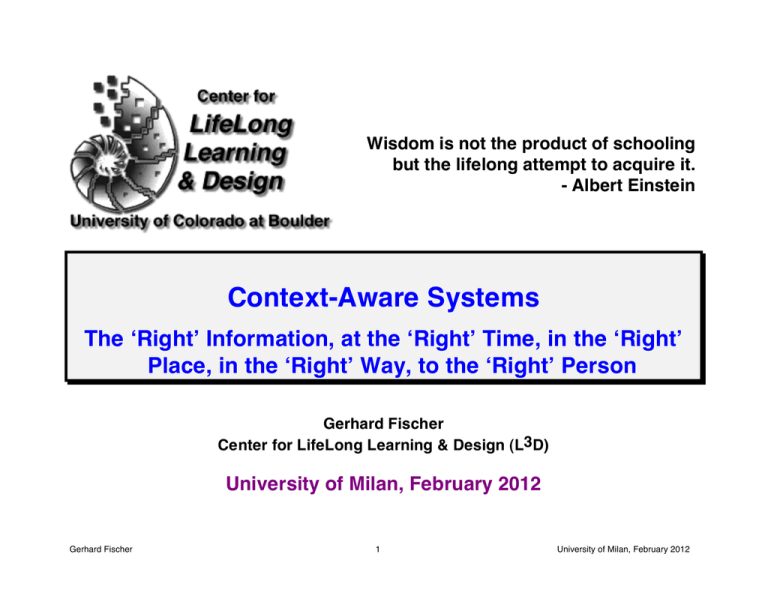
Wisdom is not the product of schooling but the lifelong attempt to acquire it. - Albert Einstein Context-Aware Systems The ‘Right’ Information, at the ‘Right’ Time, in the ‘Right’ Place, in the ‘Right’ Way, to the ‘Right’ Person Gerhard Fischer Center for LifeLong Learning & Design (L3D) University of Milan, February 2012 Gerhard Fischer 1 University of Milan, February 2012 Overview Motivating Examples Context and Context-Awareness Problems Addressed by Context-Aware Systems Exploring Particular Aspects of Context-Aware Systems L3D’s Research in Context Aware Systems Implications and Future Research Gerhard Fischer 2 University of Milan, February 2012 The Basic Challenge “the interaction between people and computers requires essentially the same interpretive work that characterizes interaction between people, but with fundamentally different resources available to the participants Suchman, L. A. (1987) Plans and Situated Actions, Cambridge University Press, a major research objective of human-centered computing (HCC): to create a synergy between human and computational resources with socio-technical environments Gerhard Fischer 3 University of Milan, February 2012 The ‘Old’ Days — The Human-Computer Dyad: Human and Computer connected by a narrow explicit communication channel explicit communication channel Gerhard Fischer 4 University of Milan, February 2012 Knowledge-Based HCC: Broader Explicit and Additional Implicit Communication Channel Knowledge about problem domain communication processes communication agent human knowledge implicit communication channel knowledge base explicit communication channel Gerhard Fischer 5 University of Milan, February 2012 Understandability, Learnability and Common Ground Gerhard Fischer 6 University of Milan, February 2012 Information Delivery and Intrusiveness: Inferring from Gestures and Behavior Gerhard Fischer 7 University of Milan, February 2012 Context Awareness in Todays World? Timeline = Share and highlight your most memorable posts, photos and life events on your timeline Gerhard Fischer 8 University of Milan, February 2012 Context determining factors: o the people involved (including their background knowledge and their intentions) o the objective of the interaction (including the task to be carried out) o the time and place where the interactions take place challenges o how to obtain information relevant for the context o how to represent context information o how to use context information Gerhard Fischer 9 University of Milan, February 2012 Problems Addressed by Context-Aware Systems information overload and human attention o “What information consumes is rather obvious: it consumes the attention of its recipients. Hence a wealth of information creates a poverty of attention, and a need to allocate efficiently among the overabundance of information sources that might consume it.” — Herbert Simon o see also: Simonʼs example of the U.S. State Departmentʼs misanalysis of printing bottlenecks unarticulated design intent providing information “to anyone, at any time and at any place” the five ‘Rights’ Gerhard Fischer 10 University of Milan, February 2012 The ‘Right’ Information, at the ‘Right’ Time, in the ‘Right’ Place, in the ‘Right’ Way to the ‘Right’ Person <<‘right’ is in quotes because in most cases there is no simple ‘right’ or ‘wrong’>> the ʻrightʼ information — requires task modeling (and can be inferred from partial constructions in design, from interests derived from previous actions (e.g.: books bought, movies watched) or described via specification components) the ʻrightʼ time — addresses intrusiveness of information delivery (e.g.: when to notify a user about the arrival of a e-mail message, when to critique a user about a problematic design decision); it requires to balance the costs of intrusive interruptions against the loss of context-sensitivity of deferred alerts the ʻrightʼ place — takes location-based information into account Gerhard Fischer 11 University of Milan, February 2012 …………….in the ‘Right’ Way to the ‘Right’ Person the ʻrightʼ way — differentiates between multi-model representations; e.g.: by using multimedia channels to exploit different sensory channels is especially critical for users who may suffer from some disability the ʻrightʼ person — requires user modeling; e.g.: as it is exploited in recommender systems and in intelligent tutoring systems Gerhard Fischer 12 University of Milan, February 2012 Exploring Particular Aspects of Context Location-based information systems — have focused on a narrow notion of context: how to capture location automatically by hardware and software sensors Recommender systems — have explored techniques for recommending various products or services to individual users based on the knowledge of users' tastes and preferences as well as users' past activities (such as: previous purchases, previous articles read, previous search commands issued) Gerhard Fischer 13 University of Milan, February 2012 Exploring Particular Aspects of Context Ambient Intelligence research — has analyzed environments with many embedded devices where these devices can recognize the situational context of users and exploit the additional information for personalization and customization L3D’s research — focused on design activities and high-functionality environments, specifically exploring unique aspects of context aware systems such as: o articulating design intent with specification components (examples: specification component in kitchen design (Kumiyo Nakakoji), drawing an equilateral triangle) o critiquing systems (generic, specific, and interpretive) o information access and delivery (example: passive and active help systems) o intrusiveness (spelling correctors, notifications, passive versus active systems) o synergy between adaptive and adaptable components (example: sliders (Tammy Sumner), Auto-Correct in MS-Word) Gerhard Fischer 14 University of Milan, February 2012 Drawing an Equilateral Triangle Gerhard Fischer 15 University of Milan, February 2012 Creating More Context by Articulating Design Intentions Gerhard Fischer 16 University of Milan, February 2012 L3D Research in Context-Aware Systems Information Sharing: Access (“Pull”) and / or Delivery (“Push”) examples access (“pull”) browsing, search engines, bookmarks, passive help systems strengths non-intrusive, user controlled weaknesses task relevant knowledge may remain hidden because users can not specify it in a query major supporting users in expressing queries, system better indexing and searching algorithms design challenges Gerhard Fischer 17 delivery (“push”) Microsoft’s “Tip of the Day”, broadcast systems, critiquing, active help systems, agentbased systems serendipity, creating awareness for relevant information, rule-enforcement intrusiveness, too much decontextualized information context awareness (intent recognition, task models, user models, relevance to the taskat-hand) University of Milan, February 2012 Computing User- and Task-Relevant Information Delivery in a High-Functionality Environment (HFE) Gerhard Fischer 18 University of Milan, February 2012 Adaptation Mechanism to Control Different Critiquing Rule Sets and Different Intervention Strategies (Tammy Sumner) VM-Residential Gerhard Fischer 19 University of Milan, February 2012 A Comparison between Adaptive and Adaptable Systems Definition Knowledge Strengths Weaknesses Mechanisms Required Application Domains Gerhard Fischer Adaptive dynamic adaptation by the system itself to current task and current user contained in the system; projected in different ways little (or no) effort by the user; no special knowledge of the user is required user has difficulty developing a coherent model of the system; loss of control Adaptable user changes the functionality of the system knowledge is extended user is in control; user knows her/his task best; systems become incompatible; user must do substantial work; complexity is increased (user needs to learn the adaptation component) models of users, tasks, and dialogs; support for meta-design incremental update of models active help systems, critiquing end-user modifiability, tailorability, systems, recommender systems definition of filters, design in use 20 University of Milan, February 2012 Design Trade-Offs for Context-Aware Systems filter bubbles / group think versus making all voices heard making information relevant to the task at hand versus serendipity intrusiveness versus reacting too late remembering versus forgetting o Bell, G., & Gemmell, J. (2009) Total Recall o Mayer-Schönberger, V. (2009) Delete — the Virtue of Forgetting in the Digital Age o Bannon, L. J. (2006) "Forgetting as a Feature, Not a Bug: The Duality of Memory and Implications for Ubiquitous Computing," in CoDesign privacy versus decontextualized systems control by the systems versus control by the user Gerhard Fischer 21 University of Milan, February 2012 Gerhard Fischer 22 University of Milan, February 2012 Book Description THE TOTAL RECALL REVOLUTION IS INEVITABLE. IT WILL CHANGE WHAT IT MEANS TO BE HUMAN.IT HAS ALREADY BEGUN. What if you could remember everything? Soon, if you choose, you will be able to conveniently and affordably record your whole life in minute detail. You would have Total Recall. Authors Gordon Bell and Jim Gemmell draw on experience from their MyLifeBits project at Microsoft Research to explain the benefits to come from an earth-shaking and inevitable increase in electronic memories. In 1998 they began using Bell, a luminary in the computer world, as a test case, attempting to digitally record as much of his life as possible. Photos, letters, and memorabilia were scanned. Everything he did on his computer was captured. He wore an automatic camera, an arm-strap that logged his bio-metrics, and began recording telephone calls. This experiment, and the system created to support it, put them at the center of a movement studying the creation and enjoyment of e-memories. Since then the three streams of technology feeding the Total Recall revolution-digital recording, digital storage, and digital search, have become gushing torrents. We are capturing so much of our lives now, be it on the date--and location--stamped photos we take with our smart phones or in the continuous records we have of our emails, instant messages, and tweets--not to mention the GPS tracking of our movements many cars and smart phones do automatically. Gerhard Fischer 23 University of Milan, February 2012 Gerhard Fischer 24 University of Milan, February 2012 Book Description Delete looks at the surprising phenomenon of perfect remembering in the digital age, and reveals why we must reintroduce our capacity to forget. Digital technology empowers us as never before, yet it has unforeseen consequences as well. Potentially humiliating content on Facebook is enshrined in cyberspace for future employers to see. Google remembers everything we've searched for and when. The digital realm remembers what is sometimes better forgotten, and this has profound implications for us all. In Delete, Viktor Mayer-Schönberger traces the important role that forgetting has played throughout human history, from the ability to make sound decisions unencumbered by the past to the possibility of second chances. The written word made it possible for humans to remember across generations and time, yet now digital technology and global networks are overriding our natural ability to forget-the past is ever present, ready to be called up at the click of a mouse. MayerSchönberger examines the technology that's facilitating the end of forgetting-digitization, cheap storage and easy retrieval, global access, and increasingly powerful software--and describes the dangers of everlasting digital memory, whether it's outdated information taken out of context or compromising photos the Web won't let us forget. He explains why information privacy rights and other fixes can't help us, and proposes an ingeniously simple solution--expiration dates on information-that may. Delete is an eye-opening book that will help us remember how to forget in the digital age. Gerhard Fischer 25 University of Milan, February 2012 Filter Bubbles source: E. Pariser. (2011). Beware online "filter bubbles" (TED Talk). http://www.ted.com/talks/eli_pariser_beware_online_filter_bubbles.html the design trade-off: o no person can afford to pay attention to more than a very small fraction of new things produced (“demassification”) o a culture can not survive long unless all of its members paid attention to at least a few of the same things (“massification”) Gerhard Fischer 26 University of Milan, February 2012 Context-Awareness: Apps on the I-Phone local traffic reporting + Siri (intelligent assistant) + ……………….. Gerhard Fischer 27 University of Milan, February 2012 Context-Awareness and Human-Centered Computing Human-Centered Computing should serve the benefit of users the design of context-aware systems must take into account the importance and influence of social contexts to make the technical systems desirable, usable, useful, meaningful at a personal and social level basic message of this presentation: create a generic conceptual/theoretical framework for context aware systems based on the lessons learned with L3D’s research efforts over the last two decades Gerhard Fischer 28 University of Milan, February 2012
